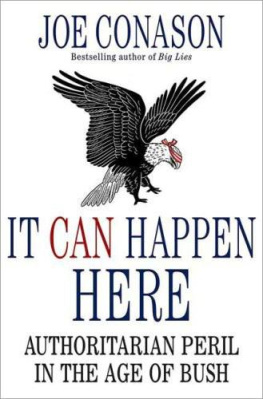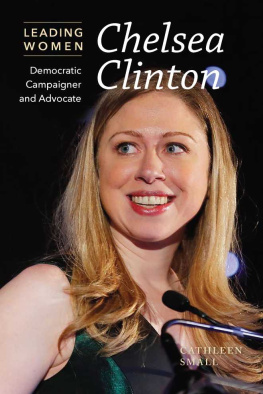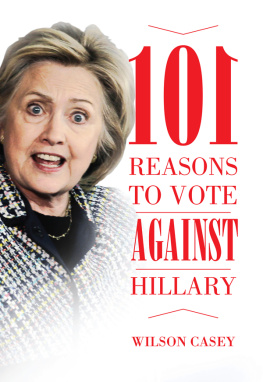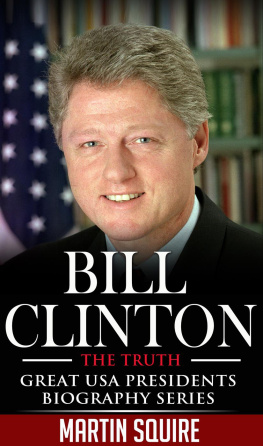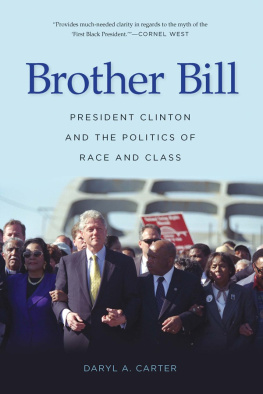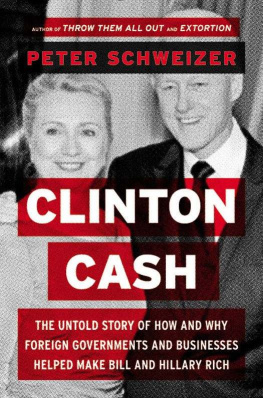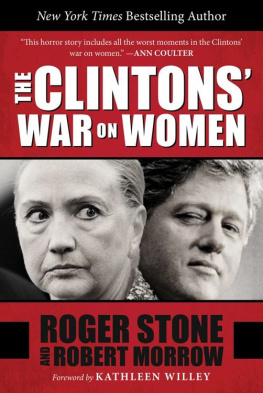ALSO BY JOE CONASON
The Hunting of the President: The Ten-Year Campaign to Destroy Bill Clinton (with Gene Lyons)
Big Lies: The Right-wing Propaganda Machine and How It Distorts the Truth
The Raw Deal: How the Bush Republicans Plan to Destroy Social Security and the Legacy of the New Deal
It Can Happen Here: Authoritarian Peril in the Age of Bush

Simon & Schuster
1230 Avenue of the Americas
New York, NY 10020
www.SimonandSchuster.com
Copyright 2016 by Joe Conason
All rights reserved, including the right to reproduce this book or portions thereof in any form whatsoever. For information address Simon & Schuster Subsidiary Rights Department, 1230 Avenue of the Americas, New York, NY 10020.
First Simon & Schuster hardcover edition September 2016
SIMON & SCHUSTER and colophon are registered trademarks of Simon & Schuster, Inc.
For information about special discounts for bulk purchases, please contact Simon & Schuster Special Sales at 1-866-506-1949 or .
The Simon & Schuster Speakers Bureau can bring authors to your live event. For more information or to book an event contact the Simon & Schuster Speakers Bureau at 1-866-248-3049 or visit our website at www.simonspeakers.com.
Interior design by Paul J. Dippolito
Jacket design by Jackie Seow
Jacket photography by Andrew Hetherington/Redux
Back cover photography courtesy of the Clinton Foundation
Library of Congress Cataloging-in-Publication Data
Names: Conason, Joe, author.
Title: Man of the world : the further endeavors of Bill Clinton / Joe Conason.
Description: First Simon & Schuster hardcover edition. | New York : Simon & Schuster, 2016. | Includes index.
Identifiers: LCCN 2016031629 (print) | LCCN 2016032161 (ebook) | ISBN 9781439154106 (hardcover : alk. paper) | ISBN 9781439154113 (trade pbk. : alk. paper) | ISBN 9781439156223 (ebook)
Subjects: LCSH: Clinton, Bill, 1946- | Presidents--United States--Biography. | United States--Politics and government--1989
Classification: LCC E886 .C66 2016 (print) | LCC E886 (ebook) | DDC 973.929092 [B] --dc23
LC record available at https://lccn.loc.gov/2016031629
ISBN 978-1-4391-5410-6
ISBN 978-1-4391-5622-3 (ebook)
For Eleanor and Edward, who already have begun to understand why our common humanity must bring us together. And for their mother, who has taught them so well.
CHAPTER ONE
On the first morning he woke up as a private citizen there was nobody around to serve breakfast to Bill Clinton. For eight years he and Hillary had lived in the White House, where staffers and servants rushed to meet every need; and for ten years before that, they had lived in the Arkansas Governors Mansion, where similar if not quite equal personal service had always been available at any hour.
It was Sunday, January 21, 2001and that was all over now.
Both Clintons rose to face their new life somewhat exhausted from the long ordeal of Inauguration Day, which had begun in the White House greeting the new occupants, then continued through the ceremonial investiture of President George W. Bush amid snow and sleet, a protracted farewell with hundreds of friends and staffers at Andrews Air Force Base, and an unusually long journey from Washington to their new home.
Under the foreboding sky, a freezing downpour had grounded the Marine helicopter that was supposed to transport them from the capital, and had later slowed the usual hours drive from John F. Kennedy Airport to Chappaqua, roughly forty miles north of the city. There they had ended the day dining late at a local restaurant with daughter Chelsea, their close friends Terry McAuliffe and his wife Dorothy, and Douglas Band, a former deputy assistant to the president who had agreed to stay with Clinton into his post-presidency.
Nobody had known just how tired the former president was until he fell fast asleep in the Chevy Suburban that brought them all from Kennedy Airport to Westchester.
When the Clintons came downstairs on that first morning, the former president and first lady realized that not only was there nobody available to prepare breakfast for them, but that they had no idea how to make even a cup of coffee in their sparsely furnished and rarely occupied new home. Neither did any of the others standing around in the kitchen with them. But everyone needed caffeine, badly.
Lets go get some coffee, said Clinton.
The first executive decision of William Jefferson Clintons post-presidency was to venture into the snowy little town to visit the local delicatessen and bring back some coffee and sandwiches. Pulling on a bright yellow fleece sweatshirt over his T-shirt and jeans, Clinton joined Band in an armored Cadillac limousine, driven by a Secret Service agent, followed by another vehicle with four more agents.
Clinton noticed the first hint of trouble a few minutes later, when they arrived at Langes Little Shop and Delicatessen on King Street, the towns main drag. The delis Sunday morning crowd of customers was friendly enough, with a few people shouting Eight more years! and We love you, Bill! But reporters were milling on the sidewalk, too. When they spied Clintons small entourage pulling up, a few began to bark questions. At first he could barely hear what they were saying.
Why did you pardon Marc Rich?
Alarmed, Doug Band leapt out of the back passenger seat and walked around to the other side of the car, where Clinton already had stepped out. He put an arm around Bands shoulder and whispered softly but firmly: Ill give you five minutes to clear all this away. He didnt want the armored limousine and all the agents swarming around the closed street. He wanted to arrive in his new hometown more in the style of an ordinary citizen.
Minutes later, Clinton ventured into the crowded deli, where spontaneous applause lit his face with a smile. While Band placed their order, including an egg-salad sandwich for Clinton, he shook hands with his new neighbors, posed for cell phone snapshots, and signed autographs on scraps of paper.
There was no means of escape from the gang of perhaps a dozen or so reporters, which felt to Clinton and Band like a horde of hundreds who suddenly had total access to the former president. Nor did Clinton feel he could simply walk away without answering any of their questionssome friendly, some not so friendly. New York Times reporter Adam Nagourney, who had covered both Clintons for years, would later write that the president appeared in a chatty mood, relaxed and rested as he mingled with neighbors and reporters.
So far its been wonderful, Clinton said of life after the presidency. On his first night in Chappaqua he had slept like a rock, he addedand no, he hadnt bothered to read the Sunday papers or turn on the television yet.
With pleasantries out of the way, what ensued was an impromptu press conference. The journalists peppered a wholly unprepared ex-president with inquiries about the scores of pardons and commutationstotaling 177he had signed during his last day in the White House. Mostly he responded to the questions in generalities, offering a promise to prepare a memo on the pardon process for his successor, and a short lecture on compassion toward former sinners.
The word pardon is somehow almost a misnomer, said Clinton. Youre not saying these people didnt commit the offense. Youre saying they paid, they paid in full. In fairness, he suggested, we ought to be more open-minded about individuals who have discharged their debt to society.


